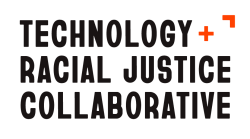Technology
Structured decision-making and technology
The Center is exploring the use of risk assessment instruments, algorithmic tools, and artificial intelligence in the criminal legal system and other systems that govern people's lives.
These tools have been designed, deployed, and advanced as mechanisms to improve decision-making, but carry with them the potential to exacerbate and reify the racial bias that already infects that systems of governance. The Center convenes researchers, advocates, and national leaders on algorithmic tools and technologies and collaborates with social justice and technology focused organizations to produce reports, tool kits, and scholarship to more fully understand the impact that these tools have on communities of color.
As new insights emerge, we engage in advocacy at the local and national level to ensure decision-makers are armed with the right information to make certain that if and when tools are deployed, they are used to reduce, rather than exacerbate, racial harm and inequality. Some examples of the Center's work in this space includes:
- Report by Co-Faculty Director Vincent Southerland: The Master's Tools and a Mission: Using Community Control and Oversight Laws to Resist and Abolish Police Surveillance Technology
- The Use of Pretrial "Risk Assessment" Instruments: A Shared Statement of Civil Rights Concerns
- Membership on the New York City Automated Decision Systems Task Force
- Litigating Algorithms 2018 and 2019
Report with ACLU: What Does Fairness Look Like? Conversations on Race, Risk Assessment Tools, and Pretrial Justice
Technology and Racial Justice Collaborative Quarterly Newsletter
We are pleased to announce the publication of the first quarterly newsletter of the Technology and Racial Justice Collaborative, a new project of the Center on Race, Inequality, and the Law. TRJC's quarterly newsletter provides feature articles, legislative updates, and news about advocacy addressing algorithmic bias and surveillance in the criminal legal system. Read the first installment of the newsletter here!
Freedom of Information Act (FOIA) Training for Beginners
In this training, co-sponsored by The Center on Race, Inequality and the Law and the Electronic Frontier Foundation, learn the ins and outs of how to initiate and navigate records requests from the federal government using the Freedom of Information Act (FOIA).
Race and Technology News Updates
Court Cases
EFF Tells Minnesota Supreme Court to Strike Down Geofence Warrant As Fourth Circuit Court of Appeals takes the Wrong Turn, EFF (7/19/24)
SFPD skirted facial recognition ban, lawsuit says. Hundreds of cases could be in jeopardy, The San Francisco Standard (7/18/24)
City and State Updates
In Chicago, ShotSpotter Sparks a Political Power Struggle, The Trace (7/19/24)
Is DeSoto's investment in ShotSpotter paying off?, CBS News (7/18/24)
S.T.O.P. Condemns Adams' Plan For Subway Metal Detectors In 'Next Few Days,' S.T.O.P. (7/17/24)
Detroit Takes Important Step in Curbing the Harms of Face Recognition Technology, EFF (7/15/24)
Detroit police revise crime-fighting tech policy, World News Group (7/11/24)
New York joins cities questioning ShotSpotter costs, benefits, Smart Cities Dive (7/11/24)
Federal Updates
General News Updates
Beyond Pride Month: Protecting Digital Identities for LGBTQ+ People, EFF (7/17/24)
Mall of America's new AI-fueled facial recognition tech sparks pushback, Axios (7/11/24)
Global Updates
UN Cybercrime Draft Convention Dangerously Expands State Surveillance Powers Without Robust Privacy, Data Protection Safeguards, EFF (7/17/24)
Reining in AI: What NZ can learn from EU regulation, Tech Xplore (7/12/24)
People and Events to Note
FOIA 101: Tips and Tricks to Make You a Transparency Master | MuckRock
Report: SELLING SURVEILLANCE: FACT VS. AD FICTION | S.T.O.P.
Report: People on Electronic Monitoring | Vera Institute of Justice
Upcoming Event: EFF Livestream Series | August 28: Reproductive Justice in the Digital Age


